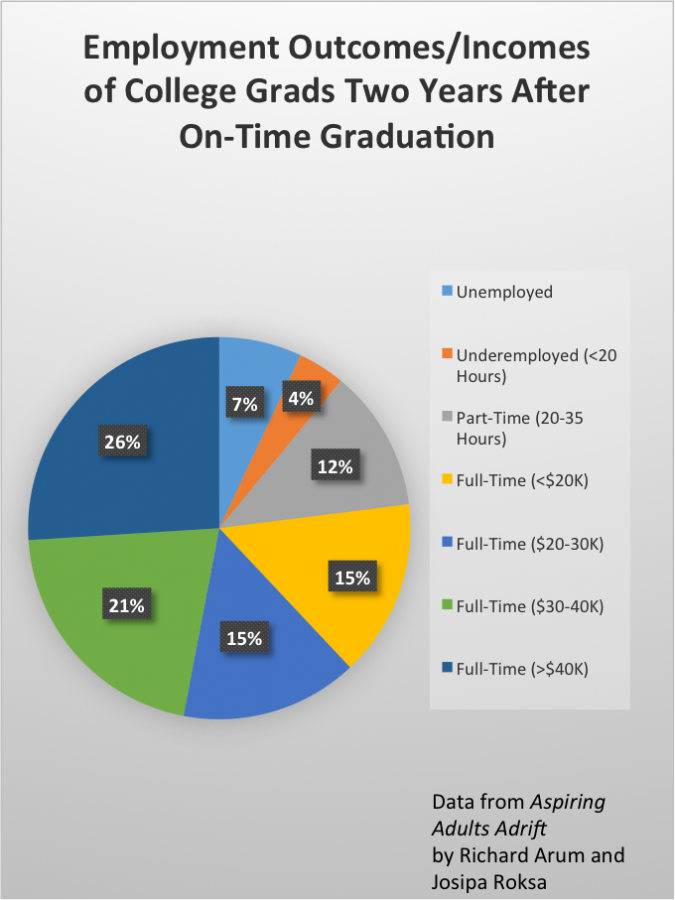Pitt grads find life after college scary, rewarding
October 8, 2014
After four years of networking with Deloitte LLP, Olivia Domachowski will graduate from Pitt this spring, skip over the job search and land on track working with the company.
“I will be going to private and public companies to audit their financial statements to make sure they are free of material misstatements,” Domachowski said.
Domachowski secured a full-time job in August at the end of her internship with Deloitte LLP, an audit, financial advisory, tax and consulting firm with a location in Pittsburgh.
Next Semptember, Domachowski will be on the audit staff in the Pittsburgh office using the skills she learned at Pitt.
For many of her classmates, the transition from college to career won’t be so immediate.
Research from sociologists at New York University and University of Virginia shows that almost one-quarter of recent graduates are living at home. Additionally, three-quarters of recent graduates have received financial assistance from parents.
Pitt graduates and seniors lining up for graduation are aware of the bleak job market, and, even though the school year has just started, many have made post-graduate plans or have a vision of where they would like to be in a year.
Yet, some statistics continue to give students hope.
Researchers Richard Arum and Josipa Roksa created a pie chart in 2011 that displays employee outcomes and incomes of 1,000 adults two years after they graduated college. Twenty-six percent of recent college graduates were employed full-time and earning more than $40,000 per year. Twenty-one percent were employed full-time and making between $30-40,000 per year. Fifteen percent were employed full-time but making between $30-20,000 per year. Another 15 percent were employed full-time but making less than $20,000 per year. Seven percent were unemployed. Four percent were underemployed, and 12 percent were part-time.
For some students, looking to the fast-approaching future doesn’t always mean considering careers just yet.
Bethany Jones has been determined since she visited Las Vegas last year to move out of Pittsburgh.
“I was like, I have to live here at some point in my life,” said Jones, a senior math and economics major. “Why not right after college, because if I don’t like it I can always leave?”
Jones does not have a job lined up but hopes to be a financial analyst.
“While I’m looking [for a job] I will probably just get a job [in] the Strip or at a store,” Jones said.
Jones isn’t planning on moving until the end of the summer after she finishes her summer internship as a financial analyst at Bank of New York Mellon Corporation in Pittsburgh. The company has not yet offered her a job.
Caroline Koenig is not only ready to leave Pittsburgh, but also the country.
Early next year, Koenig, who graduated in the spring with a degree in neuroscience and chemistry, will be starting her position as a Peace Corps volunteer.
Koenig said she’s not sure what country the Peace Corps will assign her to,, but she would prefer to volunteer in Africa on a public health project.
After a medical volunteer trip to Belize during her freshman year, Koenig said she started thinking about applying to the Peace Corps. Since she plans to attend medical school, the 27-month commitment almost stopped her from applying.
“If I didn’t apply, I might have looked back and [thought] I should’ve just done that,” Koenig said.
Volunteering does not come with a reduction in student loans, but some loan companies allow volunteers to defer their loans until they come return, Koenig said. She will take advantage of loan deferment.
For seniors who are preparing to transition to post-college life, Koenig has some advice.
“Once you have your plan figured out, execute it in a timely manner,” Koenig said. “It’s nice to know things sooner rather than later.”








